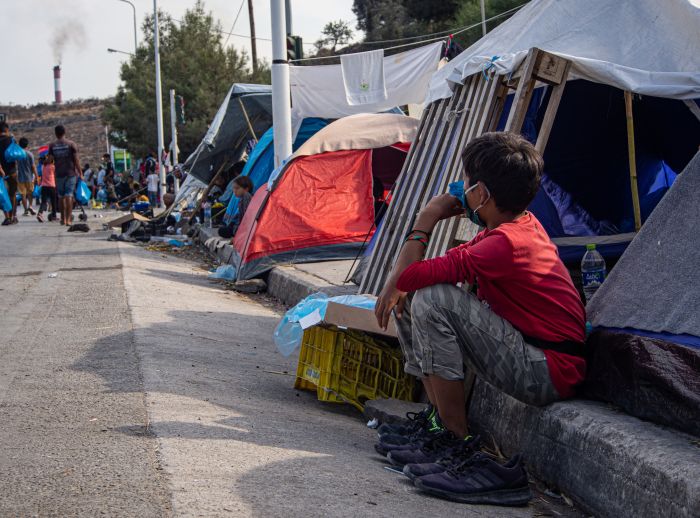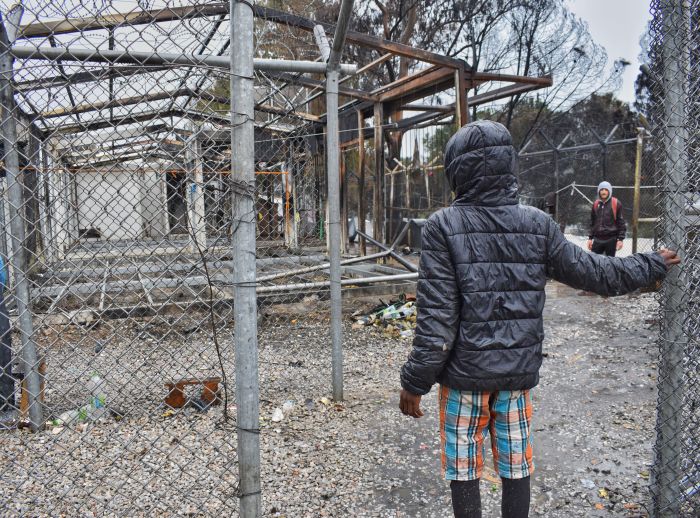- 4 mins read time
- Published: 22nd October 2020
Alone in the world, the children of Moria deserve a safe haven

"Welcome to Prison"
By Erin McKay, Campaigns and Advocacy Executive with Oxfam Ireland
These words, scrawled across a concrete wall at the entrance to the camp, greeted everyone who entered Moria. Moria was a refugee camp on the Greek island of Lesvos, a short distance across the sea from Turkey and served as a main transit route to Europe for people who are seeking asylum from persecution.
On a cold February day in 2018, my colleague and I passed these words as we wandered down the muddy and trash lined lanes of Moria. The camp was densely overcrowded with more than 11,000 people crammed into a space that was only ever meant to accommodate 3,000. We weaved in between makeshift tents cobbled together with tarp and duct tape; covered in the mud that plagued the camp in winter. Little faces poked out from the open flaps of these tents to wave at us as we walked by. We shuffled down a steep incline as water running from the trash heaps on the side of the road threatened to spill into our boots and arrived at a high chain link fence where the guards check our credentials and wave us in. This area, aptly called “the pen” is where unaccompanied minors – children who arrive in Europe without their family or a legal guardian – are held.
Inside this “pen”, a prison within a prison, there were children everywhere. On this winter day, most were not dressed for the cold and all were saturated in mud. I saw children caring for younger siblings, small children playing with trash and no adults in sight. Doctors I worked alongside in the camp would be called into "the pen" and the detention cells holding unaccompanied minors to respond to suicide attempts and self-harm injuries. Unimaginably, the children inside “the pen” are the lucky ones – they were able to prove their age. Other unaccompanied children, mostly teenage boys who do not have documents showing their status as minors, are left to fend for themselves on their own among the general population. These children are at high risk of exploitation and violence.
I left Moria two years ago, heartbroken and terrified. Scared for the young children trapped in unsafe, unhealthy and unfit conditions without their family or someone to care for them.
18 Irish NGOs sign letter requesting urgent relocation of young refugees displaced by Moria fire

Moria was a prison and that prison burnt to the ground.
The camp, which was holding 13,000 people, 634 of whom were unaccompanied children, went up in flames on 8 September 2020. This came after a strict lockdown was imposed in response to the camps first recorded case of Covid-19. The competing tragedies of the spreading virus, fire and additional displacement are just the latest heartbreak in the lives of the people living in Moria. Even before the pandemic, the overcrowded conditions on this island were inhumane, unhygienic and unsafe.
The fire was a fully preventable tragedy and is the consequence of years of a misguided response from the EU and its member states to the arrival of people fleeing conflict and persecution. In March 2020, Ireland joined a coalition of the willing – EU member states that signed up to take a portion of the 1,600 unaccompanied minor children being held on the Greek Islands. This welcome initiative further illustrates Ireland’s long history as an island of refuge for the most vulnerable and in need of shelter. To date, Ireland has relocated eight children as a part of this coalition with the relocation of another four young people now in motion. In the wake of this tragedy and the ongoing Covid-19 crisis, we need to relocate the rest of the unaccompanied minors that we have committed to take and bring them safely to Ireland as soon as possible.
The unaccompanied minors at Moria have now fled twice: once from persecution and violence in their home countries and now from the burning camp. These children, alone in the world, are in need of a safe place now more than ever.




